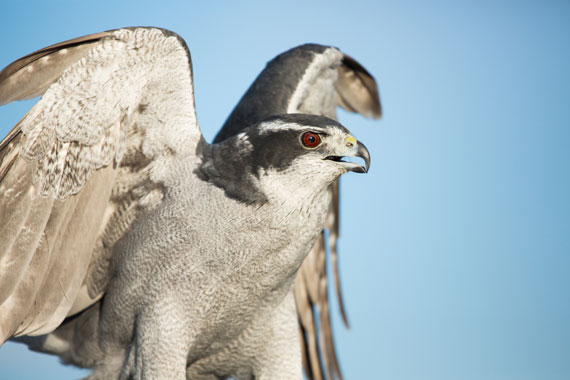I graduated from college in the spring of 2008, just as the economy shuddered, gasped, and died. Not that the fatality mattered much to me at the time. Having spent the previous four years reading philosophy—Plato, Kant, Hume, and more Derrida than is likely healthy for a developing brain—I was borderline unemployable anyway. Or so I’d been told by the jerks in the Econ. Department.
As it turns out, a navel-gazer with his head in the clouds can actually make for a decent biological wildlife technician, once his gaze has been redirected to the duff underfoot and his view of the clouds blocked out by a baseball cap with one of those goofy sunburn-preventing neck flaps. Despite my lack of formal scientific training, I managed to philosophize my way onto a Forest Service research crew. Peace out, St. Augustine! Catch you on the flip side, Wittgenstein!
The Accipiter hawks of Arizona’s Kaibab Plateau, a 700-square-mile maze of ponderosa pine and Douglas fir just north of the Grand Canyon, never got the message about toxic loans, Wall Street’s rotten core, and systemic collapse. In their innocent, timeless way, they kept on keeping on. Kept on nesting and mating. Kept on flying and hunting. Kept on violently dismembering ground squirrels and defecating from the green heights.
Oh yes, defecating. The boss, a veteran ornithologist with a big belt buckle, bigger mustache, and a taste for “stogies” and Wild Turkey, was interested in avian demographics. That meant locating active breeding territories, tracking birds, and sending me out each morning to bushwhack a dozen or more miles in search of chalky white streaks of feces. It was a needle-in-the-haystack operation.
I thrashed up gullies thick with thorny locust. I stumbled with fatigue, swearing, sweating from pores I didn’t know existed. And, of course, I peed. And peed more—longer and clearer than I thought humanly possible. When laboring under the Cyclopean glare of Arizona’s midsummer sun, one must hydrate aggressively. After a couple of weeks without glimpsing a single speck of raptor sign, I began to wonder whether the Feds had hired me solely to water the forest floor. (Wildfire prevention, perhaps.)
Finally, on a particularly desperate afternoon in a remote and gnarly thicket, feeling certain that all was for naught and that I should have enrolled in graduate school—even Heidegger’s convoluted ontological discriminations would be better than this!—I unzipped my trousers for the sixth leak since lunch, looked down, and there it was, just beyond the toe of my boot.
Sweet, glorious turd.
Back in camp that evening, celebrating with a bonfire and a few generous nips from the Turkey bottle, I mentioned to my boss that if it had not been for the pee break I would have missed the whitewash that led me to the molted feather that led me to the prey remains that led me to the crying mama-hawk, the nest, the nestlings, and, at last, the precious data. He shot me a look over his mustache—simultaneously proud, amused, and totally serious—that spoke the words before they even left his mouth.
Swig of Turkey. “I’ve found more birds by sitting on a stump or tying my shoelace or going to the bathroom than I can count.” Puff of stogie. “If you’re in a rush—if you try too hard—you won’t see or hear a damn thing out there.” Crackle of fire. “And you won’t learn a damn thing either.”
In college, between confusing myself with the Greeks and Germans, I’d done some extracurricular dabbling in Buddhist texts, if only for the breath of fresh, Eastern air. “All Zen founders caution us about the vanity of doing ‘in order to,’” writes priest Robert Aitken. “Nan-yueh Huai-jang warned that if you do zazen in order to become a Buddha, you will never become one.” The poop-quest was a far cry from the Great Matter, but still, there did seem to be a connection.
To my delight, the remainder of the field season unfolded according to an elegantly simple pattern of drink, leak, hawk. And it wasn’t only hawks that emerged, but countless other easily overlooked details of the forest ecosystem as well. A dozen or more times a day, the end of my stream focused my awareness on porcupine quills, mountain lion tracks, crinoid fossils, Sego lilies, a bark chip in a spider’s web, a puff of pollen in the breeze, a shadow’s trembling contours. On something small and secret and special. On something that, for a single glowing moment, became everything.
During the worst financial crisis to hit the US in nearly a century, I had indeed been hired by my great and ailing country to water its public lands. My job, nay, my government mandate, was to pay attention, to empty my consciousness so that it could receive nature’s unexpected and infinite wonders. To get out of my own way. To be present and nothing but present.
What I had done, in other words, was find a bird by unzipping and letting go.
Thank you for subscribing to Tricycle! As a nonprofit, we depend on readers like you to keep Buddhist teachings and practices widely available.
